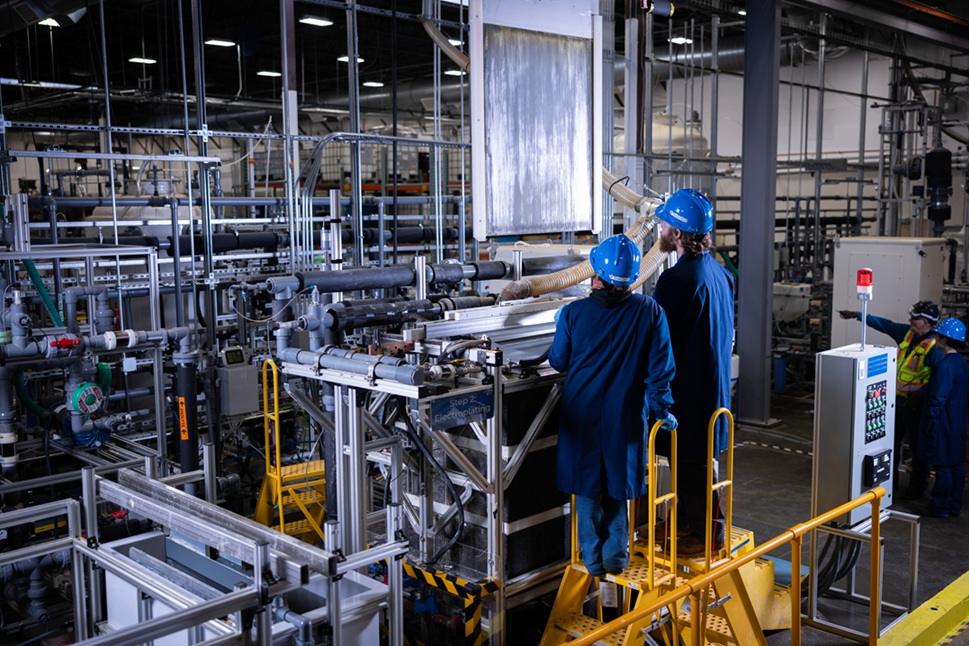Clean iron producer Electra announced a series of new agreements, including purchase deals with several global steel companies to help reduce the carbon footprint of their products, and an Environmental Attribute Credit (EAC) agreement with Meta to help address the social media and communications giant’s supply chain emissions.
Founded in 2020, Colorado-based Electra has developed a low-temperature process to electrochemically refine iron ore into 99% pure iron, using chemistry and renewable energy in place of traditional ironmaking’s coal and extreme heat. The process works by dissolving iron ore in an acidic solution, removing co-products from the solution and then running electricity through the solution to electrodeposit the iron onto metal sheets. Key benefits of the technology include the ability to use intermittent renewable energy due to the low-temperature needs of the process, and to use a wide range of ores, including previously mined and unused materials, compared with traditional ironmaking, which requires high grade ores as feedstock. The process also removes co-products such as silica and alumina, reducing waste and preserving critical minerals.
Alongside the purchase agreements, Electra announced that it has selected the site of its new demonstration facility in Jefferson County, Colorado, with the 130,000 square foot facility anticipated to begin operations in mid-2026, and to produce up to 500 metric tons of low-carbon, high-purity iron annually.
Supporting the construction of the new facility, Electra announced a new $50 million grant from the Bill Gates-backed Breakthrough Energy Catalyst, and an $8 million dollar tax credit from the Colorado Industrial Tax Credit Offering (CITCO), adding to the company’s recent $186 million Series B funding round.
Mario Fernandez, Head of Catalyst at Breakthrough Energy, said:
“Steel production is one of the largest sources of emissions, driven primarily by the energy-intensive step of refining iron. Electra is reimagining the fundamentals of ironmaking, enabling a scalable, cost-effective pathway to low-carbon steel.”
Electra’s new agreement with Meta comes as the social media focuses on its goal to achieve net zero emissions across its value chain by 2030, while also addressing the challenges to reach its target as it builds out infrastructure to accommodate the rapid growth of AI. Meta recently announced that it is piloting the use of mass timber in the construction its data centers, in place of emissions-intensive materials such as steel and concrete. Under the new agreement, Meta will purchase verified EACs linked to the reduced emissions from Electra’s clean iron, and will also have the option to purchase EACs for CO2 reduction from future Electra commercial facilities.
John DeAngelis, Head of Clean Technology Innovation at Meta, said:
“Meta is thrilled to collaborate with Electra to advance low-carbon iron and steel – critical data center building solutions – made here in the U.S. Through this partnership and our commitment, we aim to demonstrate a pathway for these innovative materials to scale.”
Electra’s purchase agreements with steel companies include deals with U.S. steelmaker Nucor to use Electra’s clean iron in its Electric Arc Furnace (EAF) steelmaking, as well as with Toyota Tsusho America to sell Electra’s clean iron to steelmakers and distribute green steel to automakers, and with INTERFER Edelstahl Group to use clean iron, following qualification, in specialty steel applications to help customers meet their decarbonization goals.
Nucor, Interfer Edelstahl Group and Toyota Tsusho Corporation also participated as strategic investors in Electra’s recent Series B funding round.
Sandeep Nijhawan, CEO of Electra, said:
“We started Electra to fundamentally reinvent the way the world makes iron and tackle one of the biggest sources of industrial emissions, but we’ve always known we could not do it alone. With binding commitments and support from strategic partners, we are proving that pure iron can be made resourcefully and scaled quickly to meet global demand.”

